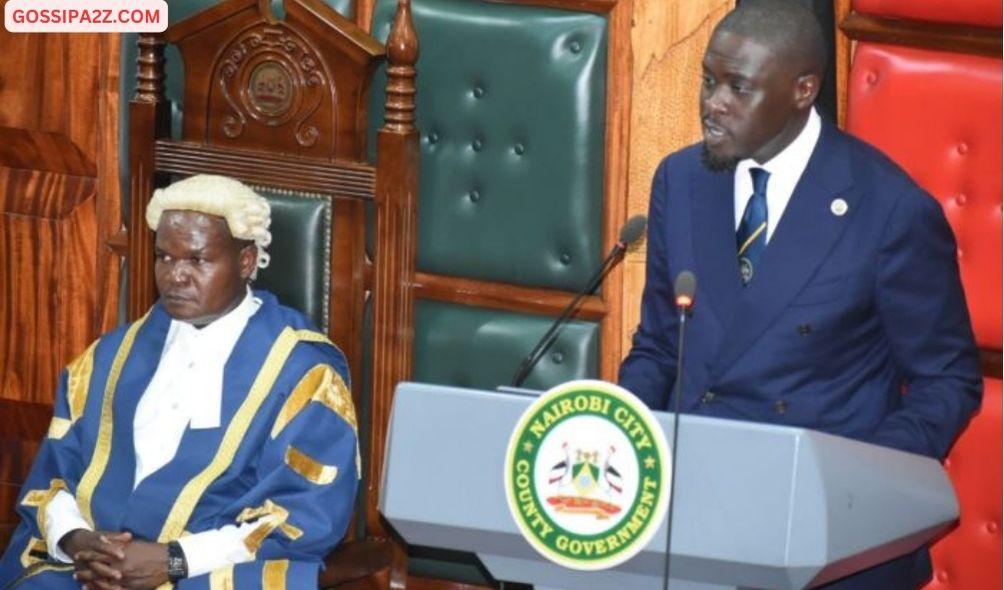List: Auditor General Flags Eight Irregularities Over Sakaja’s County Expenditure
The Nairobi County Governor, Johnson Sakaja, is under close examination due to findings of financial improprieties brought to light by Auditor General Nancy Gathungu.
The report has sparked significant worries regarding the fiscal handling of the county administration, with Governor Sakaja being scrutinized for accountability issues.
In her extensive examination of the financial statements for the fiscal year ending on June 30, 2023, Gathungu has pinpointed eight significant areas of interest.
ALSO READ:
- “Two Groups, One Agenda”: Gachagua Accuses Raila of Secret Political Deals
- Exclusive: Ida Odinga’s 75th Birthday Party in Karen (Photos)
- FKF President Discloses Exact Amount Paid to Harambee Stars Players
- Gachagua’s Ally Senator John Methu Admits Ruto Might Win 2027 Elections
- Maraga Explains Why He Hasn’t Campaigned in Kisii Despite 2027 Bid
The inconsistencies, which vary from incorrectly categorized expenses to payments lacking proper documentation, cast doubt on the precision and comprehensiveness of Nairobi County’s financial documentation.
“I have obtained all the information and explanations which, to the best of my knowledge and belief, were necessary for the audit,” stated Gathungu in her report.
“In my opinion, the financial statements do not present fairly the financial position of the County Executive of Nairobi City as of 30 June, 2023, and of its financial performance and its cash flows for the year then ended,” asserted Gathungu.
Governor Sakaja is now confronted with the challenging responsibility of clarifying the discrepancies highlighted in the report to the Public Accounts Committee.
Here are the key areas of concern raised by the Auditor General:
1) Variances Between Financial Statements and Trial Balance:
Discrepancies between the Integrated Financial Management Information System (IFMIS) trial balance and financial statements cast doubt on the accuracy and completeness of the financial records.
2) Variances Between Financial Statements and Ledger:
Variances totaling millions of Kenyan Shillings between reported amounts in financial statements and ledger balances further question the reliability of the financial data.
3) Inaccuracies in Pending Accounts Payable:
Significant variances in pending accounts payables balance raise concerns about the accuracy and completeness of financial records, with unexplained discrepancies running into billions of shillings.
Gathungu could not verify the accuracy and completeness of the pending account payables balance of Ksh98 billion.
4) Misclassification of Expenditure:
Misclassification of expenditure items, contrary to approved account codes, indicates deficiencies in financial management practices, with misclassified expenditure constituting a significant portion of audited items.
5) Inaccuracies in Cash and Cash Equivalents:
Anomalies in bank balances, including inaccurate opening balances and unexplained discrepancies, highlight deficiencies in cash management and reconciliation processes.
6) Unsupported Payments for Nairobi Metropolitan Services (NMS) Contracts:
The lack of documentation to confirm outstanding payments related to Nairobi Metropolitan Services projects raises questions about the appropriateness of payments made by the County.
“…no documentation was provided to confirm the outstanding payments under NMS were transferred to the County and approved for payment appropriately. Further, the County transferred Ksh3.7 million to NMS during the financial year under review. In the circumstances, the accuracy and completeness of acquisition of assets amount of Ksh620.6 million could not be confirmed,” stated the report.
7) Unsupported Utilities, Supplies, and Services Payments:
Transactions recorded as paid but untraceable in bank statements, coupled with unsupported payment vouchers, suggest inadequate documentation and controls over expenditure on utilities and services.
The report shows that Gathungu could not confirm the accuracy and completeness of the payments under utilities amounting to Kshs.163.7 million.
8) Unsupported Payments for Goods and Services:
Payments made to suppliers for goods and services without proper documentation and verification indicate potential irregularities in procurement and payment processes.
Gathungu stated, “Review of bank statements shows that various suppliers were paid a total amount of Kshs.60,866,140 for the supply and delivery of goods which included flood lights and drainage materials. However, these payments could not be traced to the ledgers while the payment vouchers were not provided for audit.”
The report from the Auditor General arrives as Nairobi County maintains its position as the top performer in revenue generation among decentralized government entities. In the 2022/23 fiscal year, Nairobi County collected Ksh8.16 billion, surpassing the total revenue of Ksh36.8 billion generated by all 47 counties, as indicated in a report by the National Treasury on financial statements.
The administration led by Governor Sakaja is currently under increasing pressure to tackle the issues highlighted by the Auditor General and rebuild trust in the county’s financial management.
List: Auditor General Flags Eight Irregularities Over Sakaja’s County Expenditure
